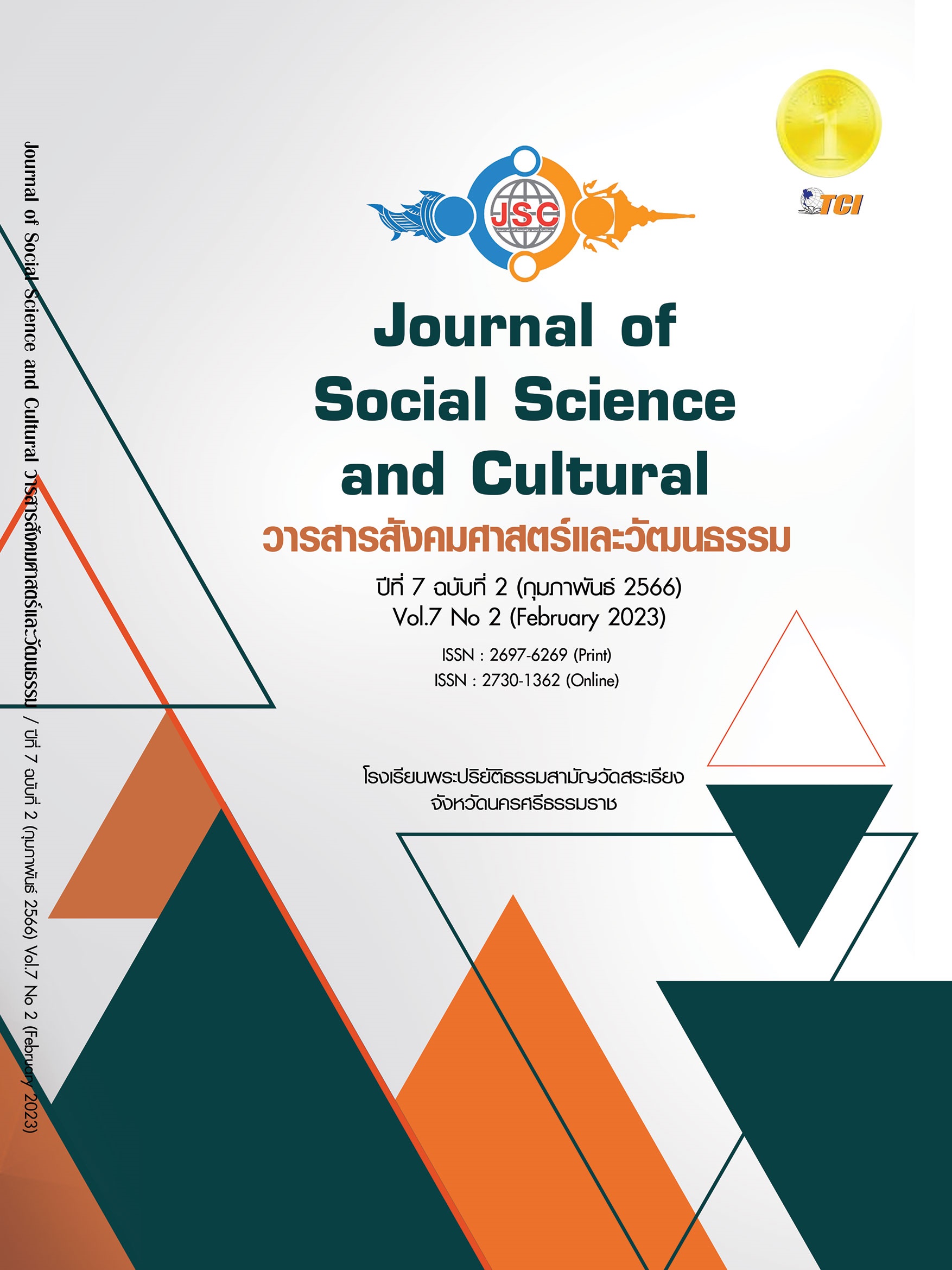ADAPTION OF CHANTABURI LOCAL FOOD IDENTITY IN TOURISM CONTEXT
Main Article Content
Abstract
The objectives of this research article were to study Adaption of Chanthaburi Local Food in Tourism Context. Research methods through document analysis and in-depth interviews. Population groups that are key informants consisting local community groups, restaurant entrepreneurs, government organizations, Educational Institutions and Tourist Groups totaling 47 people. The research was used the concept of cultural adaptation to analysis. The results Chanthaburi Local Food divided into 5 eras which consists of Food for family era, Food for tradition era, Food for souvenir, Food revives era and Food for festival era. Originally, it was a natural adaptation to cook in the family and was expanded to a society were activities. Since the after economic crisis has adapted according to the policy. It has been transformed into a tourism product. Foods are hybrids between local culture and west cultures. Although there is no reference to traditional. But maintain value, meaning and local ingredients that indicate the identity of Chanthaburi for example Garcinia cowa, Amomum xanthioides Wall, Cardamom Chanthaburi local food, besides that role of tourism product. It also serves to indicate Chanthaburi Identity, serves to conserve local wisdom, serves to jobs and benefit for people. And Food for festival era have a driving towards Food for medication Campaign and UNESCO's Creative Food City. It makes Chanthaburi local food adjust the new role including the roles of health to realize of eating and build confidence in the consumption of food for medication in a suitable way.
Article Details
References
กาญจน์ กรณีย์. (24 สิงหาคม 2564). อาหารท้องถิ่นจันท์ในอดีต. (นายวิฆเนศวร ทะกอง, ผู้สัมภาษณ์)
กาญจนา แก้วเทพ. (2553). การบริหารจัดการวัฒนธรรมพื้นบ้านแบบมีส่วนร่วมด้วยนวัตกรรมการวิจัย. กรุงเทพมหานคร: ภาพพิมพ์.
กาญจนา แก้วเทพและคณะ. (2554). สื่อพื้นบ้านศึกษาในสายตานิเทศศาสตร์. กรุงเทพมหานคร: ห้างหุ้นส่วนจำกัดภาพพิมพ์.
ทิพย์พธู กฤตสุนธร. (2554). สายธารแห่งการศึกษาการปรับตัวทางวัฒนธรรม. ใน สื่อพื้นบ้านศึกษาในสายตานิเทศศาสตร์. กรุงเทพมหานคร: ห้างหุ้นส่วนจำกัดภาพพิมพ์.
ธนู อนัญญพร. (7 ตุลาคม 2564). บทบาทของกรมพัฒนาชุมชนในการส่งเสริมด้านอาหารท้องถิ่น. (นายวิฆเนศวร ทะกอง, ผู้สัมภาษณ์)
เธียรชัย อิศรเดชและคณะ. (2547). สื่อพื้นบ้านกับการพัฒนาท้องถิ่น: กรณีโนราของภาคใต้. วารสารนิเทศศาสตร์ จุฬาลงกรณ์มหาวิทยาลัย, 22(3), 30-44.
ประภาพรรณ ฉัตรมาลัย. (22 สิงหาคม 2564). อาหารท้องถิ่นจันท์ในยุคครัวเรือน. (นายวิฆเนศวร ทะกอง, ผู้สัมภาษณ์)
ผู้จัดการออนไลน์. (2561). เปิดวิสัยทัศน์ รัฐมนตรีเมืองรอง วีระศักดิ์ โควสุรัตน์ ชู จันทบุรี ขึ้นแท่น ต้นแบบ เมืองรอง”. เรียกใช้เมื่อ 23 สิงหาคม 2563 จาก https://mgronline. com/travel/detail/961000 0094802
รัตติกาล เจนจัด. (2556). สื่อสาร อาหาร สุขภาพ. กรุงเทพมหานคร: ห้างหุ้นส่วนจำกัดภาพพิมพ์.
สมรักษ์ ชัยสิงห์กานนท์. (2544). รสนิยม: ภาษาในสังคมไทยยุคบริโภคนิยม. กรุงเทพมหานคร: สำนักพิมพ์แห่งจุฬาลงกรณ์มหาวิทยาลัย.
สมสุข หินวิมาน. (2558). ได้กินไข่ดาวสดๆ คาวๆ หอมๆ ฟุ้งๆ อย่าลืมบ้านทุ่งที่กินผักบุ้งแกงคั่ว: การสื่อสารอาหารข้ามชาติในกระแสโลกาภิวัฒน์. วารสารศาสตร์, 8(1), 81-120.
สำนักงานจังหวัดจันทบุรี. (2564). แผนพัฒนาจังหวัดจันทบุรี พ.ศ.2566-2570. จันทบุรี: กลุ่มงานยุทธศาสตร์และข้อมูลเพื่อการพัฒนาจังหวัดจันทบุรี.
สุนี ศักดาเดช. (2549). อาหารท้องถิ่น เอกสารคำสอน คณะวิทยาศาสตร์และเทคโนโลยี. จันทบุรี: มหาวิทยาลัยราชภัฏรำไพพรรณี.
โสรัจจ์ วิสุทธิ์แพทย์. (2557). ภูมิปัญญาอาหารท้องถิ่น: การจัดการเพื่อส่งเสริมการท่องเที่ยวในภาคตะวันออก. ใน ดุษฎีนิพนธ์ปรัชญาดุษฎีบัณฑิต สาขาวิชาวัฒนธรรมศาสตร์. มหาวิทยาลัยมหาสารคาม.
อร่าม อรรถเจดีย์. (8 มีนาคม 2565). ความหลากหลายของอาหารจันท์. (นายวิฆเนศวร ทะกอง, ผู้สัมภาษณ์)
อุกฤษณ์ วงศ์ทองสาลี. (5 กุมภาพันธ์ 2565). รสชาติอาหารท้องถิ่นจันท์. (นายวิฆเนศวร ทะกอง, ผู้สัมภาษณ์)
Ashley, B. et al. (2004). Food and Cultural Studies. London: Routledge.
Berger, P. & Luckmann, T. (1967). The Social Construction of Reality: A Treatise in the Sociology of Knowledge. Great Britain: Penguin Book.
Berry, J. W. et al. (1987). Comparative Studies of Acculturative Stress. The International Migration Review, 21(3), 491-511.
Williams, R. (1981). Culture. London: Fontant Press.


